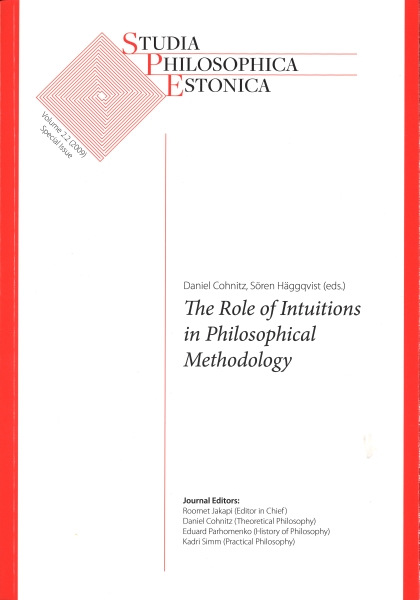Loose Constitutivity and Armchair Philosophy
DOI:
https://doi.org/10.12697/spe.2009.2.2.10Keywords:
experimental philosophy, armchair philosophy, intuitions, constitutivity, semantics, conceptual analysisAbstract
Standard philosophical methodology which proceeds by appeal to intuitions accessible "from the armchair" has come under criticism on the basis of empirical work indicating unanticipated variability of such intuitions. Loose constitutivity---the idea that intuitions are partly, but not strictly, constitutive of the concepts that appear in them---offers an interesting line of response to this empirical challenge. On a loose constitutivist view, it is unlikely that our intuitions are incorrect across the board, since they partly fix the facts in question. But we argue that this ratification of intuitions is at best rough and generic, and can only do the required methodological work if it operates in conjunction with some sort of further criteria of theory selection. We consider two that we find in the literature: naturalness (Brian Weatherson, borrowing from Lewis) and charity (Henry Jackman, borrowing from Davidson). At the end of the day, neither provides the armchair philosopher complete shelter from extra-armchair inquiry.
References
Alexander, J. and Weinberg, J. (2007). Analytic epistemology and experimental philosophy, Philosophy Compass 2: 56-80.
Antony, L. (2003). Who’s afraid of disjunctive properties?, Philosophical Issues 13: 1-21.
Bealer, G. (1999). A theory of the a priori, Philosophical Perspectives 13: 29-55.
Chalmers, D., Manley, D. and Wasserman, R. (eds) (2009). Metametaphysics: New Essays on the Foundations of Ontology, Oxford University Press, New York.
Davidson, D. (1980). Essays on Actions and Events, Oxford University Press, New York.
Fodor, J. (1974). Special sciences, Synthese 28: 97-115.
Goldman, A. (2007). Philosophical intuitions: Their target, their source, and their epistemic status, in C. Beyer and A. Burri (eds), Philosophical Knowledge: Its Possibility and Scope, Rodopi, Amsterdam, pp. 1-26.
Jackman, H. (forthcoming). Semantic intuitions, conceptual analysis, and cross-cultural variation. To appear in Philosophical Studies.
Knobe, J. and Nichols, S. (eds) (2008). Experimental Philosophy, Oxford University Press, New York. Lewis, D. (1983). New work for a theory of universals, Australasian Journal of Philosophy 61: 343-377.
Lewis, D. (1984). Putnam’s paradox, Australasian Journal of Philosophy 62: 221-236.
Lewis, D. (1992). Meaning without use, Australasian Journal of Philosophy 70: 106-110.
Lewis, D. (2001). Redefining ‘intrinsic’, Philosophy and Phenomenological Research 63: 381-398.
Nichols, S. and Knobe, J. (2007). Moral responsibility and determinism: The cognitive science of folk intuitions, Nous 41: 663-685.
Nolan, D. (2009). The a posteriori armchair.
Sosa, E. (2006). Experimental philosophy and philosophical intuition, Philosophical Studies 132: 99-107.
Sosa, E. (2009). A Virtue Epistemology: Apt Belief and Reflective Knowledge, Vol. Clarendon Press, Oxford.
Swain, S., Alexander, J. and Weinberg, J. M. (2008). The instability of philosophical intuitions: Running hot and cold on truetemp, Philosophy and Phenomenological Research 76: 138-155.
Weatherson, B. (2003). What good are counterexamples?, Philosophical Studies 115: 1-31.
Weinberg, J. M., Alexander, J., Buckner, C. and Gonnerman, C. (forthcoming). Are philosophers experts? Philosophical Psychology (in press).
Weinberg, J. M., Nichols, S. and Stich, S. (2001). Normativity and epistemic intuitions, Philosophical Topics 29: 429-460.
Williamson, T. (2004). Philosophical ‘intuitions’ and skepticism about judgement, Dialectica 58: 109-153.
Williamson, T. (2008). The Philosophy of Philosophy, Wiley-Blackwell, Hoboken.





